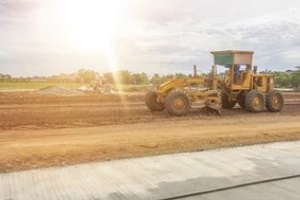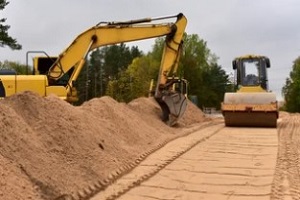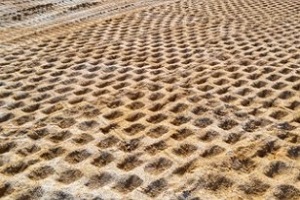 Soil compaction is often discussed in the context of construction. It is important because it provides stability and support to any structures that are built on top of the soil by increasing its resilience, improving its strength and reducing its compressive ability.
Soil compaction is often discussed in the context of construction. It is important because it provides stability and support to any structures that are built on top of the soil by increasing its resilience, improving its strength and reducing its compressive ability.
However, soil compaction can be problematic in a garden bed. Here is a look at everything there is to know about soil compaction and when it is appropriate.
What Is Soil Compaction?
Soil compaction is a process used to increase the density of soil by removing voids of air between its particles. It is typically done by mechanical means with a tool that is passed over the soil repeatedly to ensure it is properly compacted.
When Is Compaction Useful?
Soil compaction provides a flat base for a range of construction projects to give them stability and firm support. It is frequently used for projects such as highways, pavements, trenches, backfill, buildings, foundations and earth dams.
When soil on a site has not been compacted, it can lead to very serious problems. For example, the soil can settle down under the load of what is built upon it over time, leading to reduced bearing capacity. In addition, it could slide downward and allow water to pass underneath the surface of a foundation. This could lead to erosion and uplift pressure that may eventually cause the building to settle down or collapse. When it comes to roads, improper compaction could cause the pavement to settle and pipes beneath the road to crack.
When Is Compaction Problematic?
In garden beds, soil that is too compacted can render plants unable to access the water, oxygen and nutrients they need to take in from the soil through their roots. In compacted soil, the particles are pressed together too tightly, which collapses the small pockets of air that healthy plants thrive on.
There are several ways these issues can compromise a garden’s success. For example, when roots are unable to move freely through soil vertically, they will seek a more horizontal path. In addition to affecting the plants surrounding them, they also tend to form shallow root systems wherein plants have reduced access to needed nutrients.
It is also problematic for seedlings as they will struggle to push their way through the soil in their search for the sunlight they need to grow. Compaction and poor soil aeration can destroy the beneficial fungi that plants need to grow. In addition, compacted soil has lower water retention.
What Types of Soil Compaction Are There?
 Static or vibratory force is generally used for compacting soil. Static force means that the weight of the machine is used for compressing the soil. With vibratory methods, a mechanically driven force is used to achieve compaction.
Static or vibratory force is generally used for compacting soil. Static force means that the weight of the machine is used for compressing the soil. With vibratory methods, a mechanically driven force is used to achieve compaction.
For topsoil, static compaction methods such as a kneading compressor may be used, while vibratory methods are best for compacting deeper layers of soil.
Before soil can be compacted, it is essential to have an idea of the type of soil in question and its conditions as different soil types vary dramatically in moisture content and density. The grain size is generally used to determine the category of the soil.
Cohesive
In cohesive soil, the particles stick together. This means that high-impact compaction is the best approach. One popular type of cohesive soil is clay.
Granular
Granular soil has particles that vary in size and offers good drainage, such as sand or gravel. Vibratory and shaking compaction are good choices for compacting this type of soil.
Granular And Cohesive
When the soil has a combination of cohesive and granular characteristics, it is best to choose the approach based on the most prevalent type of soil in the mix.
Is There Any Way To Avoid Soil Compaction?
If you are planting a garden and you are concerned about soil compaction, there are a few ways that you can avoid it. For example, when planting transplants, it is important to plant them using an appropriate depth and avoid pressing the soil down around the plant with a lot of pressure.
Watering using a gentle spray setting is advised as an intense spray can pound down on the soil and cause compaction. It is also important to avoid walking on soil or using equipment on it as the weight of these activities can lead to soil compaction and negatively impact the structure of the soil.
Mulch can also be added to garden beds to provide another layer of protection to the soil beneath and decrease the impact of heavy rain. Moreover, as mulch breaks down, it will improve the soil’s properties.
Compacted soil can be reversed by breaking up the soil particles and allowing air to work its way through it. If the soil is heavily compacted, the garden bed can be worked with a garden fork. It may also be amended with organic soil amendments and things like grass clippings or compost to improve its structure.
How Can You Tell If Soil Is Compacted?
 A home gardener does not need to use special devices to determine the presence of soil compaction. A simple test known as a soil compaction squeeze test can be used. It entails picking up soil and giving it a gentle squeeze. Soil that forms a pasty ball in the squeeze test rather than sticking together or falling away tends to be more claylike and therefore more prone to compaction.
A home gardener does not need to use special devices to determine the presence of soil compaction. A simple test known as a soil compaction squeeze test can be used. It entails picking up soil and giving it a gentle squeeze. Soil that forms a pasty ball in the squeeze test rather than sticking together or falling away tends to be more claylike and therefore more prone to compaction.
Whether or not soil should be compacted depends on its intended use. For example, when backfilling a yard after a pool removal, it is vital that the soil is thoroughly compacted if structures will be placed over it, such as gazebos or decking. If the area is going to be used as a garden, however, a top layer of soil that is not compacted should be placed above the compacted ground for optimal plant growth.
Reach Out To Dirt Connections
For all matters related to dirt for construction and home improvement products, get in touch with the team at Dirt Connections. We offer a broad range of residential and commercial construction, fill dirt and pool removal services.
Summary

Dirt Connections was started with one goal in mind: providing quality residential and commercial construction services to clients on time and on budget. Reach out for more information on how we can support your next project.
For your convenience our estimates are free and by appointment. Call 703-940-9949 for a free estimate today!










































